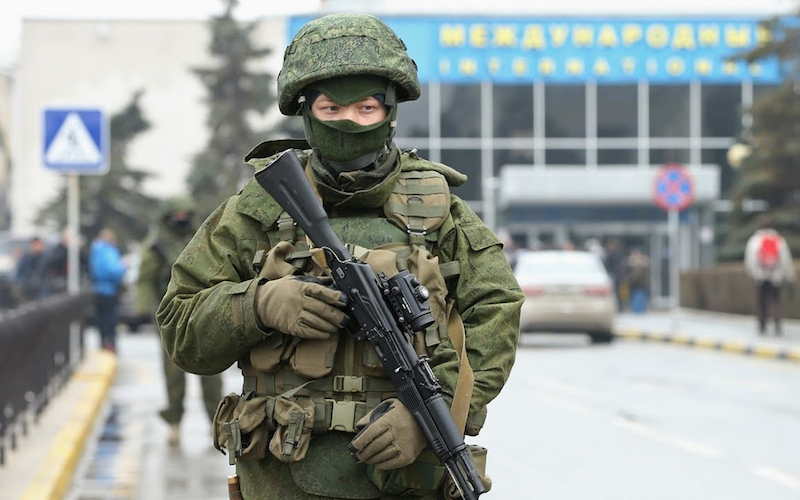
Materialism has Rendered Us Incapable of Understanding the World
“This planet has – or rather had – a problem, which was this: most of the people living on it were unhappy for pretty much all of the time. Many solutions were suggested for this problem, but most of these were largely concerned with the movement of small green pieces of paper, which was odd because on the whole it wasn’t the small green pieces of paper that were unhappy.” – Douglas Adams, The Hitchhiker’s Guide to the Galaxy
The Russian invasion of Crimea in February of this year surprised Western observers and caught the Obama administration unaware. An op-ed in the New York Times appearing 3 days before the invasion predicted that Russian intervention was unlikely since “Moscow does not need to govern more people; it needs to raise the health, education and work standards in its own people’s lives.”
Once the Crimea had been annexed, experts agreed that direct Russian intervention in eastern Ukraine was not in the cards. One analyst wrote that Russia would not intervene directly for two reasons “The first is the fear of economic sanctions that the U.S. and Germany have threatened to impose in the event of any military intervention. The second is that Moscow does not want to get involved in a conflict that could be potentially destructive for its economy.” This sanguine attitude was not limited to pundits, the CIA seems to have agreed that Russian intervention in Crimea was unlikely.
When these predictions turned out to be incorrect, Western officials were shocked. John Kerry said “You just don’t in the 21st century behave in 19th century fashion by invading another country on completely trumped up pre-text.”
However, that is just what happened. Why were Western governments and intelligence agencies so wrong about Russian intentions?
The logic behind these predictions reflected the value system of liberal and capitalist societies more than any realistic assessment of Russian views and values. The reaction of the EU and the NATO member states has been governed by a notable disregard for considerations pertaining to values or identity. The idea of going to war with Russia in order to uphold the sovereignty of the Ukraine was immediately shelved by NATO governments, as was the principle of commitment to existing obligations and treaties. In 1994 the U.S., France and the U.K. signed an agreement known as the Budapest Memorandum on Security Assurances. In it, those states – as well as Russia but that is a different matter – affirmed their commitment to “the Independence and Sovereignty and the existing borders of Ukraine.”
What also has not entered into these discussions are the abstract principles which supposedly underpin the value system which the West holds dear. The United States has sent generations of boys to risk their lives in defense of the principle of making the world “safe for democracy” in such locales as Normandy, Inchon and Fallujah.
The pragmatic considerations of realpolitik have also played a minor role in the policies of both the U.S. and the EU. Traditionally, the U.S. has either armed or directly militarily supported its allies when faced with threats from its geopolitical rivals. This policy served two purposes. The first was to restrain the influence of rivals and prevent illiberal forms of governance from spreading, and the second was to signal other democratic states, that the U.S. would protect their interests and sovereignty. However, in the case of the Ukraine the United States has not considered deploying troops to protect the Ukraine and has also avoided providing “lethal military aid.” In other words, the Obama administration has made it a policy not to provide the Ukraine with the weapons systems it requires in order to repulse Russian interference in its territory.
Instead, moral and geopolitical considerations were supplanted by a Western obsession with profit and the bottom line. In way of a response, the E.U. and U.S. have applied a series of lackadaisical and symbolic sanctions. These sanctions have mostly targeted individuals, while stringently avoiding targeting any sector that actually matters for the undiversified Russian economy. The hesitancy to inflict meaningful sanctions on Russia is mostly a result of European economic dependence on Russia. The Russian Federation supplies a third of all European energy and imports $170 Billion worth of European products per year.
It is tempting to blame these failures on the shortcomings of specific leaders and administrations, but the shallow partisan approach underestimates the depth of our cultural misperceptions and limitations. It bears some reminding that the current vacuous and overtly materialistic status of Western culture is an aberration which stands in stark contrast to both the rest of the world and our own more principled past. The U.S. and EU face a host of possible rivals and threats, most of which stress geopolitical and ideological considerations, whether non-state actors such as ISIS and Al-Qaeda or great powers like Russia and China. Therefore, we should not base our foreign policies and intelligence assessments on the assumption that other cultures have any intention of following us into our landscape of cultural and ideational barrenness. Instead our policies should assume that identity, ideology and traditional values still mean something somewhere, whether we like it or not.

